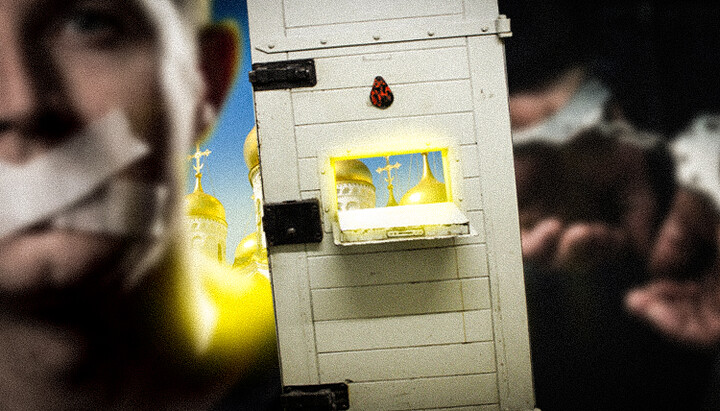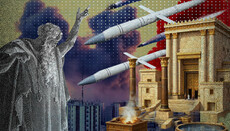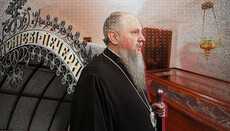Why Orthodox journalists are being tried

On March 12, 2024, the Security Service of Ukraine conducted an operation to destroy freedom of speech in the religious sphere in Ukraine.
Recently, the SBU press service reported that on March 12, 2024, security forces conducted searches of journalists working in church or near-church media outlets – the Union of Orthodox Journalists, Kozak1 (First Cossack – Trans. note) channel, as well as human rights activists and public activists – representatives of the Public Initiative "Myriany" (Laity – Trans. note) and the Center for Legal Protection of the UOC.
As a result of the measures taken, the SBU detained 4 Orthodox journalists – Volodymyr Bobechko, Valeriy Stupnytsky, Andriy Ovcharenko, and Archpriest Serhiy Chertylin. At the moment, they are all being held in a pre-trial detention without the right to bail. Several others have been charged with committing various crimes, including those punishable by life imprisonment.
On March 13, the SBU press service reported on a special operation to "eliminate the largest agent network in Ukraine since the beginning of full-scale invasion". Law enforcement officers accused the employees of the Union of Orthodox Journalists and Kozak1 of working for the aggressor state, having ties with the FSB, committing state treason, and participating in a criminal group. The accusations are very serious. But how justified are they?
Political order
In the reports of law enforcement officers, as well as in the legal proceedings that followed the destruction of the Union of Orthodox Journalists, there are so many discrepancies, logical contradictions, and elementary mistakes that the situation is very reminiscent of the cases fabricated against the Church by KGB representatives in the 1930s. Back then, people were also tried without evidence, judged for their views, and disagreement with the "party line". People's guilt was determined not by proven facts but by their political beliefs or preferences.
The prisons of the Soviet Union were filled with people who dared to criticize Marxism, or those who continued to believe in God despite the dominance of atheism at the state level in the USSR. When we read today about the trials of Stus, Khmara, or other dissidents, we are not only amazed at the cynicism of the Soviet judicial system, the lack of evidence for all accusations, but also convinced that such arbitrariness should not exist in a state that considers itself democratic. Similar feelings arise when we read about the accusations of the SBU against Orthodox journalists. And not only we.
To start with, even the adversaries of the UOC understand that the case against Orthodox journalists is political and has a commissioned character.
For example, MP of the Verkhovna Rada and one of the initiators of anti-church laws Kniazhytsky, listing the "crimes" of the UOJ, said that the publication published "harsh criticism of Europe, the Orthodox Church of Ukraine, and measures to ban the activities of the ROC in our state." According to him, he "found this information from media reports." However, Ukrainian media literally exploded with reports that the SBU had exposed the "largest FSB agent network".
So why didn't Kniazhytsky even mention this, writing that the visit of the security forces to the UOJ employees is solely related to their professional activities? Most likely because he understands himself – it's a political order.
Indirect confirmation of this thesis can be found in the statement of the Prosecutor General's Office, which said that the SBU neutralized the "media bloc of the UOC," which was created "to destabilize the socio-political and religious situation in Ukraine." How exactly did the "media bloc of the UOC" try to destabilize the situation in Ukraine? By reporting on seizures of churches, beatings of believers, or criticizing the bill to ban the Church? How exactly did the journalists of the UOJ destabilize the situation in our country? After all, by making such a statement, the Prosecutor General's Office should have provided evidence. Because in every democratic country, there is such a thing as the "presumption of innocence," according to which a person is considered innocent until proven otherwise. Not the other way around! What do we see in the case of UOJ journalists?
That you are considered guilty simply because you allow yourself to express your point of view on certain events, that you are considered guilty simply because you believe in God and do not want to belong to the church created by the state. And it is you who must prove that you are not guilty! Such a situation radically differs from what we call democracy.
Ukrainian MP Artem Dmytruk also believes that criminal cases against UOJ journalists are "absolutely absurd, fabricated, and falsified". In his opinion, they confirm that "there is no freedom of speech in Ukraine."
In the opinion of the MP, the arrests of Orthodox journalists can only be explained as an attempt to "intimidate the believers of the UOC and force them to renounce their Church".
Political analyst Kost Bondarenko also believes that the case against UOJ journalists is a "demonstrative pogrom" carried out by the power to show the deputies that the authorities are not willing to negotiate or throw in the towel.
And also "to demonstrate: this is how we will deal with everyone who tries to interfere with the authorities in cleaning up the Church -– regardless of the status of a deputy or journalist identification. Yesterday's searches and detentions are a signal to the deputies: 'Are you still persistent? Then we are coming to you!'," the political analyst wrote.
Valeriy Stupnitsky's lawyer also agrees to the idea of the political undertone of the arrest and detention of UOJ journalists, while Andriy Ovcharenko's lawyer even believes that in a civilized country, his case would not even reach the courtroom.
What does the SBU say?
In their statement about the case of Orthodox journalists, representatives of the Security Service of Ukraine made several mistakes and blunders.
For example, they claimed that Archpriest Sergiy Chertylin is the rector of one of the Kyiv temples. This is untrue. The priest is a cleric in the temple, but the rector is someone else entirely. A cleric is an ordinary priest who does not lead the congregation but only performs church services. Checking this information is very simple, but the security forces didn't bother with it. The term "rector", though not accurate, is definitely resounding!
Can we assume that this principle was also applied to the other "evidence" against journalists and human rights activists? We can. Because in the SBU's statement about "neutralizing the FSB agent network", there are other blunders.
For example, the security forces claimed that the Union of Orthodox Journalists (UOJ), Kozak1 and Myriany were "one of the largest FSB agent networks operating in the territory of Ukraine since the beginning of the full-scale invasion". However, a simple search on Google will show that all these "suspects" were established long before the full-scale invasion. The UOJ was established in 2015, Kozak1 – in 2019, and Myriany – in 2021. All these organizations operated openly, publishing materials and statements not on closed websites but freely accessible ones. And they did so for many years.
So why does the SBU claim that they became an "agent network" only on February 24, 2022? Oversight or negligence?
The SBU's press service also mentioned that there was a clear hierarchy and division of responsibilities in the "agent network." But if that's the case, then any organization with a leader, subordinates, performers, and administrators would also fall under the criteria of an "agent network." Including the SBU itself. But we understand that this is nonsense. Yes.
On the other hand, every publication, every media outlet has a clear hierarchy: there is a chief editor, managing editor, journalists, proofreaders, translators, accountants, secretaries, cleaners, and other service staff. Without hierarchy, without division of responsibilities, no publication can exist. The SBU understands this perfectly well, which is why they do not provide any evidence.
However, some media outlets (with a clear hierarchy) circulated "facts" confirming that the UOJ is an "agent network." What are these "facts"? This is a screenshot outlining a program of actions to protect the UOC. Whether it corresponds to reality is unclear. But it is absolutely obvious that even if this screenshot is true, it contains no criminal activity. This was also noted by a person whose views significantly differ from those of the UOJ editorial board.
For example, Natalya Vasilevich, a Belarusian expert in religion, politics, and human rights, an active participant in the ecumenical movement, with a position close to the Patriarchate of Constantinople, commented on a screenshot with the "guilt" of journalists, saying: "And here is the 'corpus delicti', consisting of appeals to deputies, to the Venice Commission and to Professor Thomas Bremer. All within the bounds of legality and legal mechanisms. Somehow it does not even look like a criminal case, not just a life sentence." Well, what is she wrong about?
Furthermore, the Security Service of Ukraine (SBU) attributed to the journalists the fact that they allegedly had "constant contact with the largest Russian media outlets, which immediately picked up the 'needed' content." However, firstly, no journalist in the world (!!!) is responsible for whoever might repost or "pick up" their content. Secondly, if we follow the logic of the SBU, then the connection with the largest Russian media outlets is characteristic not only for all Ukrainian publications but also by the Office of the President, the Verkhovna Rada, Ukrainian politicians, and others whose statements and comments are quoted in the aggressor state.
But again, this is an explicit lie.
So why is it then applied to journalists? Simply because they need to be silenced?
The security forces also claimed that "the coordinator of the network in Ukraine was the cleric detained by the SBU." How exactly he led the "network" and what exactly this leadership consisted of is not said. The only thing mentioned in the department is that he was responsible for disseminating materials that "instigated interfaith hatred and justified the aggressive war against Ukraine."
Question: In which precisely materials did the UOJ, for example, justify the war? If such materials exist, they should be shown. But they are not shown. And they can't be. Because from the very beginning of the war, the UOJ has taken a clear position: we categorically condemn Russia's invasion of Ukraine, we condemn the bombing of peaceful cities, the killing of civilians, and everything else that Russia is doing on the territory of our Homeland.
Our position is openly voiced and published on the website. All articles and materials are still freely available. Find at least one article or message on the UOJ' website that could be interpreted as justifying the war – and we will admit that we were wrong. But there is nothing like that and cannot be! We did not hide or conceal our position, repeatedly stating that there can be no justification for the war.
Furthermore, the editorial team of our website from the very beginning sided with the Council of the UOC in Feofania, whose decisions are blatantly condemned and criticized in Russia. Enemies of the UOC suspect the editorial staff of the UOJ of working for the SBU because of this position. How should we relate to this?
The SBU claims that we are somehow connected to the FSB, while the FSB talks about our connections with the SBU... Nonsense, absurdity, surrealism. There are no other epithets to describe the situation. But there are similar examples. For example, the early Christians were not accepted by either Jews or pagans.
In the current situation, we do not know who resembles the "Jews" or "pagans" more, but we clearly understand who is the Christian.
Therefore, we are not surprised by the words of the SBU representative who stated that journalists and human rights activists face life imprisonment. We are not surprised because Christians have always been subject to the highest measure of punishment. They were killed, cut into pieces, thrown to beasts, burned, hanged, drowned. So we are not surprised.
It's surprising indeed. Why are people who have committed terrible crimes, like Sternenko for example, who killed another person, free to appear on live broadcasts, while journalists, who are simply doing their professional duty, are facing life imprisonment? Why does the Security Service of Ukraine announce the detention of a group of individuals who tortured captives during the occupation and request a penalty of 10 to 15 years imprisonment for them, while demanding life sentences for journalists?
We're not the only ones puzzled by this. Even MP Dmytruk writes: "Journalists covering the illegal seizure of UOC temples, systematic attacks on UOC believers, and lawlessness against millions of Ukrainians, are facing LIFE IMPRISONMENT. Just think about it!". So why is this happening?"
Because, as Kostiantyn Bondarenko puts it, the authorities continue their "purge" of the Church and will remove anyone who stands in their way.
The question remains: what exactly is our government doing that independent church media are obstructing?











